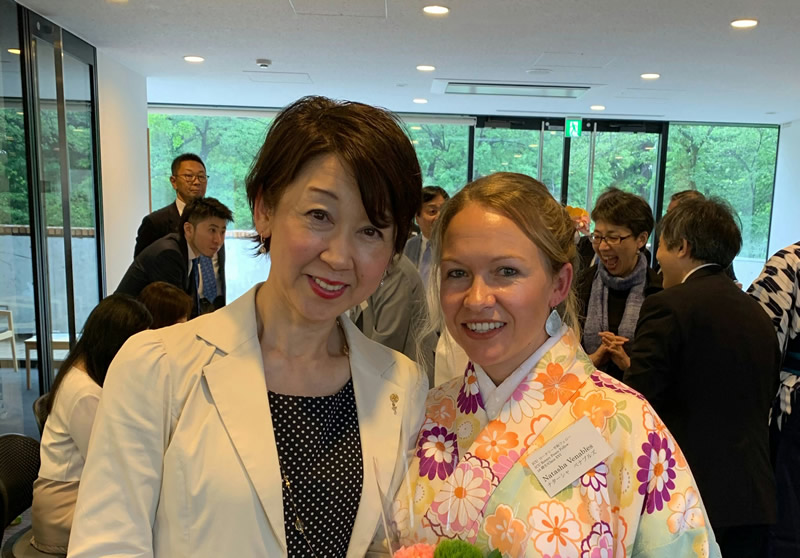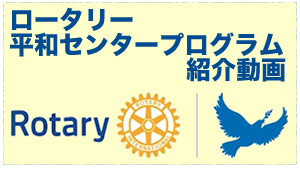卒業生の声:フェロー体験談
10.182019
ICU卒業生の声~16期生 ナターシャさん
Rotary Peace Fellow – Why I believe the Fellowship is creating more peace in the world
My first interaction with Rotary was in the development field where I was working on a remote Island that took 3 types of transport to get to , ending with a tiny fishing boat and there I saw the reach of Rotary Projects. Now I tell people I am a Rotary Peace Fellow, I see even more the way they have touched people’s lives through exchange programs, grants and a community to be part of.
Since then I have worked on many assignments in Disaster Management around the world turning me into a Global Citizen. An identity which is important to me, As I have struggled with my identity as a white African since we lost out family farm in Zimbabwe in 2003 when we were warmly welcomed in Australia as forced migrants, it was here through my work with asylum seeker refugees with Red Cross I found that I share this identity crises and lack of secure homeland with over 65.8 million other displaced people in the world who were not as lucky as my family in being warmly accepted by another country. Which of course lead me to take up research in looking at de-stigmatize and humanizing migration as the truth is it can be way to build more peace and understanding in our world if done right. My special interest is in Returnees, as an important part of that migration cycle and my thesis looking at how individuals, community and government can assist people to re-integrate back home as a durable solution to our global migration crises. The Rotary program through exchange and cultural exchange really grasps this concept and is my belief why the fellowship is contributing to building more peace in our world.
14 months ago I was successful to ICU in Tokyo, as one of the 6 peace centres, arriving in Japan I was full of innocent hope and optimism fast becoming a little disillusioned as I tried to get our 10 fellows to collaborate on a joint project for the Peace Centre and coordinate the newsletter we are asked to write – we were all so different coming from 8 different countries, aged from 25-50 speaking 10 different languages. Having different ideas of what peace means.
As this is the first question they ask us, was to write an essay on what PEACE mean to you? Which is surprisingly hard to answer.
So in the first few months of the program I realized, a unique part of this fellowship was not only the lessons in the classroom and books but in becoming like a global family to each other in a foreign country, creating a network with bonds that will go far into the future, beyond borders and create opportunities and projects far greater than envisioned. As I currently strategise with a Comumbian lady on a project for South to Suth relations.
over a year into the program I am a true advocate of the power of the peace fellowship. For a number of reasons, firstly it creates this global family – in our year we have military men, UN professionals, grassroots HR activists and so on, people many of us would never had chance to get to know in our normal day to day life let alone becoming each others support system, where we actively debate and discuss peace and the ways we can impact the world, with all our diverse backgrounds, experiences and worldviews we have real life lessons in conflict and mediation just within our Peace fellow group. As it really takes collaboration, learning from other parts of the world and networks to build peace and Rotary provides that platform.
Added to that is navigating a new cultural landscape as the fellowship sends fellows outside of their known world. Then there is the local Rotary Family who as individuals we have been deeply impacted by their kindness, warmth– helping us to navigate our new life as students and foreigners. Also reaching our families, as my parents visited Japan and were too exposed to a new culture and blown away by the hospitality of not only Japan but Rotary as an orgnisation. The sharing of our different cultures and the understanding it creates is hard to measure and reflect back quantifiably. In experiencing it myself and knowing the reality that one of the first steps that enables conflict to take place is allowing dehumanization of people, and just through the process of exposure to others it becomes harder to dehumanize a group of people or culture once you have befriended, shared experiences or learnt about their struggles and community even had to rely on their hospitality. As before going to Japan I knew very little about them except from the 2nd WW from our history books. Now I live among the Japanese and have been amazed at the similarities in my up brining as well as being humbled as I am illiterate there, unable to fully read and have been touched by what a caring and considerate people they are – as complete strangers not only notice you looking lost but in giving you directions they take the time to walk you to your destination.
This Rotary network also enabled me to reach out while in Africa and speak as rotary clubs with people there I would never have interacted with before in Zimbabwe, Zambia and South Africa. Broadening not only their view but mine – enabling me to meet people who my social ties would never have linked me to before. Creating more understanding and knowledge sharing than before.
One of my favourite quotes rings true here –
“Education is the most powerful weapon we can use to change the world” – said by a man once thought to be a terrorist but now most known as a freedom fighter and one of the most inspiring presidents – Nelson Mandela,
Having just returned from my Applied Field Experience, another gem of this program, where you get to go and practically apply what you have learnt in the last year, in the form of an internship while also doing your field work. I went to my home country where we have over 90% literacy rate, the highest in Africa, due to the investment in education largely made in the 1980/1990s– although we have been through some tough times with a history of misunderstanding, polarization and violence. Having been away for 15 years and returning, I see the power of that investment in education pulling us through now– as the people can see through the politics of hate, the blame and really desire nothing more than to make an honest living and hence a large reason why we have not gone into full scale conflict. Education enables that – sadly it is not a given as many continue to hold onto their bitterness and hurt from the past but knowledge of the truth of both sides of a story is available though critical thinking which is mainly made possible through education (formally or informally administered).
I truly believe peace is built individual to individual and this program is one big step towards that. Like all things there is room for improvement but ultimately the Peace Fellowship has made a huge impact in my life and it is making a huge difference in a number of individuals and their families lives who impact their community that impact their countries and so the cycle begins, going against the many negative and destructive cycles around us and that’s the hope we need. That is the hope I believe in.
So, thank you to all Rotarians who make this Peace Fellowship possible. And a personal huge thank you to my Host Counselor Yuko Oguma and my Host club, Matsudo Chuo for taking me under their wing in this Rotary journey and supporting me here in Japan.
なぜ私は平和フェローシップがより世界平和に貢献すると信じているのか?
第16期ロータリー平和フェロー
ナターシャ ベナブルズ(オーストラリア)
ロータリーとの最初の交流は、遠く離れた島で私が取り組んできた開発分野のことでした。そこでは私が交流プログラム、助成金、そして地域社会の一員となることを通して人々の生活に深く関わっていることを知りました。それ以来、私は世界中の多くの災害管理の仕事に携わり、私も同じ星の1人という考え方に変わりました。
14か月前、私は6つある平和センターの内の1つである、国際基督教大学(ICU)に入学しました。同級生は25歳から50歳までの8カ国の人で多様性に溢れていました。また「平和」について異なる考えを持っており、最初に「あなたにとっての平和の意味とは」と聞かれました。
このプログラムは、教室や本での学びだけでなく世界規模で家族になることによる学びがあり、平和を築くためには、このような地域のネットワークから学ぶことが必要だと感じました。
日本に行く前は、歴史の教科書で読んだ第二次世界大戦以外の事に関しては日本についてほとんど知りませんでした。しかし今は日本人の中で生活しており、自分が自然と日本人のように謙虚になっていることに驚いています。
また、このロータリーのネットワークによって、これまで交流のなかった南アフリカやザンビアなどの人々とも話すことができ、私自身の視野が広がりました。
「教育とは、世界を変えるために用いることができる、最も強力な武器である。」これはネルソン・マンデラが言った有名な言葉です。
1980年から1990年代にかけて行われた教育投資のおかげで、過去に格差の広がりや暴力の歴史という困難な時代があったのにも関わらず、アフリカで最も高い90%以上の識字率を誇っています。
15年間も離れていた祖国(ジンバブエ)へ帰ってきて、私が目にしたものは、教育における投資の力が今の現状を作っているという事です。人々は政治に対する憎悪や非難を経験し、平和な生活を望んでいます。しかし、教育のおかげで未だに本格的な紛争には陥っていません。
私たちは過去の苦しみに対し、批判的思考を用いることで物事の両面に真実があるということを知ります。それは教育が可能にするのです。
私は平和とは個人間によって作られていると信じており、このプログラムは平和への大きな一歩です。万物において、物事には常に改善の余地がありますが、この平和フェローシップは私の人生に大きな影響を与えました。また多くの人々、家族との生活、コミュニティ、国々にも大きな影響を与えています。そのような好循環は私たちの身の回りにある多くの悪循環に逆らうように絶えず進んでいます。それは私達が必要とする希望であり、信じる希望です。
この平和フェローシップのためにご尽力してくださった全てのロータリアンに感謝するとともに、日本で支えてくださっているカウンセラーの小熊祐子様をはじめ松戸中央ロータリークラブの皆様には非常に感謝しております。
(要約・翻訳 川井大介さん)







